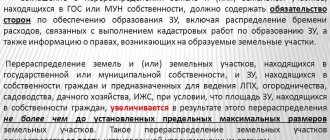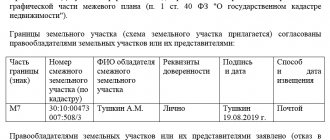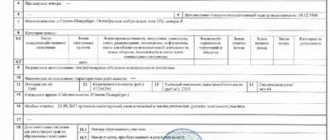Acquisition of rights
When purchasing a plot, a citizen can in addition receive a list of certain opportunities.
Having owned an allotment, a person, in accordance with legislative provisions, has the right:
- use useful resources located on the site at your own discretion. The only caveat is that found minerals cannot be sold for sale without special permission (the nuances of such a procedure are reflected in Article 18 “On Subsoil”). Moreover, their extraction must be carried out without the use of explosive processes;
- build any objects on the acquired land - this also applies to buildings for cultural and domestic purposes;
- carry out irrigation, reclamation and other measures in order to increase the fertility of the cultivated soil. There is a restriction - the owner of the plot cannot carry out operations that will in any way affect neighboring plots;
- establish the legal status of the site, change it as you please. That is, the owner can sell, lease, alienate in favor of a third party. Land pledge is also available. In other words, in one way or another, a citizen has the right to realize almost all forms of land ownership;
- dispose of products obtained in the process of using the land.
The owner of the site is granted quite a lot of rights, but he should also take into account the fixed restrictions and nuances.
Peculiarities of land management
The disposal of the property is the main right of the owner, therefore, during the disposal, he can perform various actions:
- use the land using its main useful characteristics;
- use it as a property object for various purposes.
Accordingly, the order assumes that the owner can sell the land, exchange or donate it, transfer it as an inheritance or mortgage, and also lease it.
Basics of protecting the rights of the owner of a land plot
Property rights guarantee the protection of the rights of the owner of the land. There are situations when protection of the rights of the owner is required, and the initiators for this can be different people or organizations:
- administration of the region in which the land plot is located;
- owners of neighboring plots;
- relatives of the land owner;
- founders of various cooperatives or partnerships;
- other people claiming the land.
Rights protection is implemented in several options:
- the owner contacts a geodetic company, and he must have documents confirming his right to the site, after which a statement is written against the culprit of the violation of rights;
- when fighting with neighbors, you should go to court, and all problems that arise when communicating with various partnerships or cooperatives are resolved in court;
- Disputes with administrative authorities are resolved at the administrative level or in arbitration court.
Owner's responsibilities
The acquisition of land for permanent ownership involves obtaining not only rights, but also specific obligations of a citizen:
- the use of the site must be sufficiently efficient, in accordance with the purposes prescribed by the contract;
- timely pay state fees for the sale of real estate resources, be it land tax or rent;
Responsibilities of landowners - not to infringe on the interests of other owners and tenants of the land plot. Otherwise, the victim has the right to file a claim in civil court;
- in due time, submit information to the relevant departments, by which one can judge the current legal and physical condition of the site - this information is the components for filling out cadastral registration documents;
- ensure the safety of signs installed on the ground by government agencies. In particular, this applies to geodetic and boundary markings. It is important to understand that ignoring this need is considered a serious act, entailing a number of legal consequences.
Responsibilities of land owners to protect land
Every responsible citizen must adequately understand that obtaining their own land carries with it a certain responsibility. After all, according to regulatory legal acts, he is assigned responsibilities, and if they are not observed, then significant problems can arise with government departments.
Legislative regulation
Each owner of a land plot has the right to perform various actions with this property, but they must not contradict any rules of law.
Important! The owners can be government agencies at the regional or federal level.
Some types of land may belong exclusively to government agencies, so there is no possibility of transferring them into private hands. The right of people and organizations to land is enshrined in many laws and other official documents issued by government agencies.
These include:
- articles of the civil code: 17, 18, 64 of the Constitution, 260-287 of chapter 17 of the Civil Code, 15-19 of chapter 3 of the Land Code;
- 11 GK;
- Presidential Decree No. 337;
- Privatization Law No. 1541-1;
- Federal Law on registration of rights No. 122.
Civil Code of the Russian Federation Article 17. Legal capacity of a citizen
1. The ability to have civil rights and bear responsibilities (civil capacity) is recognized equally for all citizens. 2. The legal capacity of a citizen arises at the moment of his birth and ends with death.
Civil Code of the Russian Federation Article 18. Content of the legal capacity of citizens
Citizens may have property by right of ownership; inherit and bequeath property; engage in business and any other activity not prohibited by law; create legal entities independently or jointly with other citizens and legal entities; make any transactions that do not contradict the law and participate in obligations; choose a place of residence; have the rights of authors of works of science, literature and art, inventions and other results of intellectual activity protected by law; have other property and personal non-property rights.
Important! These official documents contain information not only about rights, but also about certain responsibilities that must be fulfilled by owners. This is because certain types of citizens or organizations must be responsible in managing the land that rightfully belongs to them.
You can find out what methods exist for registering ownership of a plot of land in this video:
What rights do land owners have?
These rights are inalienable, therefore any actions with the plots must be carried out exclusively with the voluntary decision of the owner. Fundamental rights include:
- The ability to conduct various property transactions, for which appropriate contracts are concluded. These include a deed of sale or writing a land donation agreement, and also include an exchange agreement.
- It is possible to transfer land by inheritance, for which the plots are indicated in the will. If this document is missing, then after the death of the heir, his close relatives by law have the right to receive this land, for which the degree of relationship is taken into account. What is the right of lifelong inheritable ownership of a land plot - read the link.
- The plot can be reorganized by the owner, for which it is allowed to be divided or connected with neighboring plots, which are previously purchased from neighbors or government agencies.
- The division can be carried out in the process of registering land as shared ownership.
- During division, allocated plots may be sold or given to other persons.
- Land can be exchanged for different types of real estate, but it is important to consider certain rules related to divisible plots.
- It is allowed to use plots of land as collateral in the process of obtaining various loans from banking institutions.
- In some cases, it is possible to issue an easement on a land plot. This process can be carried out with individuals or various companies that pay certain amounts of money for the use of land.
- It is possible to lease the entire plot or only some part, and tenants are required to pay rental payments for its use.
- If certain conditions are met, it is possible to re-register the data of the memory, for which purpose its purpose or category changes.
Important! The basic right of each owner is the opportunity to use plots in accordance with their useful characteristics for harvesting or construction of various types of objects.
If any arbitration disputes arise in relation to a particular land plot, then it is the owner’s property rights that are the main guarantor that no outsiders will be able to lay claim to the land.
Complex of rights of land owners under the Land Code of the Russian Federation.
What responsibilities do landowners have?
In addition to rights, owners have certain obligations that must be observed by them. These include:
- If it is planned to re-register a plot, the owner is obliged to correctly and conscientiously prepare a complete package of documents to complete this process.
- There must be documentation confirming the existence of ownership of the land. These include title and title documentation, as well as a cadastral passport. How to obtain a cadastral passport for land - read this article.
- The land should be used exclusively for its intended purpose, so there should not be any violations of the basic rules.
- The area must be properly processed at certain periods of time.
- If a site is allocated for individual housing construction, then it is not allowed to plant various living plants on it, since it is necessary to erect a building here, and it must be optimal for permanent residence of people. Only 10 years are given for this process, and after this period the structure must be ready for use.
- The use of land must not in any way violate the rights of the owners of neighboring plots. The environment must also be kept clean.
- You cannot violate boundary signs or geodetic signs if they are installed on the site.
- If the land is registered as shared joint ownership, then both co-owners must take into account the rights and interests of each other.
Important! When building a house on land for individual housing construction, it is necessary to prepare numerous construction documentation, since the construction of a structure should only be carried out with the appropriate permit.
What is not included in the duties
Owners of land plots are not obliged to:
- install boundary or geodetic signs;
- order land surveying work, but this process is considered convenient for every land owner;
- pay for the use of land to government agencies or any private individuals or companies;
- independently resolve any controversial issues with neighbors, so all disagreements are resolved in court.
Important! However, owners are required to pay money as land tax, calculated by tax officials. How to calculate land tax yourself - step-by-step instructions are contained here.
Responsibilities of land owners to protect land.
What responsibilities do land owners have?
If various violations are discovered during the use of land, the owners bear responsibility for this. For this purpose, the norms of the Labor Code and the Civil Code, as well as the Code of Administrative Offenses, are taken into account. Responsibility is assigned in several cases:
- not using the sites for any purpose;
- use other than for the intended purpose specified in the land documents;
- seizure of neighbor's land illegally;
- unscrupulous attitude towards the environment;
- other violations of land use regulations.
For these violations, responsibility is assigned, which can be administrative or criminal, as well as in the payment of fines or demands to restore order. Often the use of land is completely prohibited or it is forcibly confiscated.
Legislative acts
Accurately understanding the nuances of your rights and obligations that arise when purchasing a land plot is quite problematic due to their multidirectionality and the large number of legal acts that regulate these positions.
Therefore, it is so important to highlight the basic laws, in accordance with which the general rights and obligations of a citizen are clarified - there you can also find information regarding the powers of the land owner:
- First of all, it is worth highlighting the Constitution of the Russian Federation as a regulatory document;
Powers of the land owner - It should also be noted that Federal Law No. 218 stipulates the provisions on the registration of rights to real estate;
- The Civil Code of the Russian Federation also has its own characteristics. In particular, it is worth paying attention to section 2 “Ownership rights and other real rights”, which discusses provisions of interest to the owner of real estate.
- individual regulatory decrees of the President of the Russian Federation;
- some decrees and orders of the Government of the country;
- many other regulatory legal acts that contain information on the rights and obligations of the acquirer of a land plot.
You need to understand that all these established provisions must be strictly observed - if they are ignored, the violator will be held accountable, which entails clearly negative consequences.
Rules governing the rights and obligations of land owners
The right of ownership is enshrined in numerous sources of legislation, which state this right as inviolable and limited only by the rights of other owners.
The main provisions on property are enshrined in the Constitution of the Russian Federation (Article 35,). These provisions are assimilated in the Civil and Land Codes and in the following documents:
- Articles 17, 64 of the Constitution of the Russian Federation;
- Chapter 17 of the Civil Code of the Russian Federation – articles 260-287;
- Chapter 3 of the Land Code of the Russian Federation – Articles 15-19;
- Art. 11 Civil Code of the Russian Federation;
- Decree of the President of the Russian Federation No. 337, dated March 7, 1996, on the implementation of the Constitutional rights of citizens to land.
- Law on Privatization - No. 1541-1 of July 4, 1991;
- Federal Law on Registration of Rights No. 122-FZ, dated July 27, 1997.
In addition to the rights that owners have, legislation has assigned them a number of responsibilities that must be fulfilled. They are regulated by the provisions of the articles:
- 42 Land Code of the Russian Federation;
- 12 Civil Code of the Russian Federation;
- 7.3 Code of Administrative Offenses of the Russian Federation;
- 8.3 Code of Administrative Offenses of the Russian Federation.
Chapter 3 of the Land Code identified the direct categories of owners who are allowed to responsibly manage the land resource they own. Here are the subjects of land ownership:
- Individuals and legal entities;
- state;
- regions;
- municipalities.
By the way, we wrote about how to find or recognize the owner
Responsibility
When owning any real estate, a citizen must ensure compliance with certain measures to maintain the site in accordance with the law.
For example, the provisions of the Civil Code of the Russian Federation provide for the obligation of the owner, according to which he is obliged to preserve the environment and not deteriorate the quality of soil, be it the use of chemically hazardous fertilizers, which cause contamination of the area, or carrying out intensive irrigation procedures, after which the soil may change significantly. geodetic position of the soil.
It is worth recalling that a citizen is responsible not only for maintaining the optimal condition of the land allotment, but also for possible violations regarding buildings on the assigned territory.
So, when receiving a plot of land for use, a citizen must be guided by the provisions of the Civil Code of the Russian Federation and the Constitution of the Russian Federation - this is only the first step. To eliminate cases of problems arising with government departments, it is necessary to familiarize yourself with other legislative acts - to study the pitfalls, nuances and features.
At the same time, a thorough study of these positions has a higher priority, since a land plot is a fairly attractive acquisition for numerous scammers who can cause a lot of problems in a completely legal way if a citizen does not know his rights and responsibilities.
Responsibility of the owner of the land plot
For violations committed during the exploitation of land, the owner of the allotment is liable in accordance with the norms of the Land and Civil Codes, as well as the Code of Administrative Offences.
Responsibility comes when:
- non-use of memory;
- using the memory for purposes other than its intended purpose;
- illegal seizure of adjacent territory;
- unfair treatment of the surrounding territory;
- in case of violation of other rules of use.
In this case, administrative or civil liability arises , which can be expressed:
- in an administrative or judicial requirement to restore the violated order.
- In penalties and notice of initiation of legal proceedings, by decision of the local administration.
- Termination of the right to use the site, its forced seizure by a court decision.
It is important to know about protecting property rights to your land! Also, do not forget about forms of ownership:
- private;
- public, federal.
Land ownership is the most demanding in terms of compliance with numerous standards established by federal and regional legislation. Read more about all the nuances of this topic on the main page of the section.
Legal regulation
In case of non-compliance with the rights of the owner of the land plot, he can file a claim with the Civil Court of the Russian Federation with a demand to restore the violated privileges and receive compensation in situations involving such a moment.
In actual case practice, most of the proceedings are distributed as follows:
- violation of the rights of the owner of real estate due to the actions of third parties. In this case, the plaintiff can base his claims on Art. 12 of the Civil Code of the Russian Federation, which precisely defines possible options for ensuring the safety of one’s rights in connection with their non-compliance or the prerequisites for this. The same act provides for methods of compensation for damage - both material and moral;
- challenging the degree of ownership of real estate. The review procedure will be regulated by Art. 59 of the Land Code of the Russian Federation.
Important: to ensure compliance with legal norms, it will be enough to provide judicial officers with documents confirming the right to dispose of the site.
- in case of unauthorized use of the area by third parties without concluding an agreement with the owner of the territory, the latter may file a claim on the basis of Art. 60 Land Code of the Russian Federation.
The provisions of this article provide for a similar development in the actions of citizens, therefore, in the presence of establishing documents, the victim will restore his rights in full. In this case, all buildings erected by the violator on the territory of the legal owner will be obligatory removed in the future;
- in Art. 61 of the Land Code of the Russian Federation strictly defines that if a normative act is incorrectly drawn up by executive departments that violates the rights of the owner, the court may, by its decision, annul the validity of the document.
Legal ownership of the area is quite subtly regulated by numerous articles of the country's codes, providing significant protection for the interests of the citizen. It is important to understand that in order to avoid problems with the court making the right decision, the owner must have all the title documents in hand.
Timely payment of land payments
This rule of law is contained in paragraph 5 of Art. 42 of the Land Code of the Russian Federation. The need to make timely payments has a direct connection with the principle that establishes payment for the exploitation of land.
According to this principle, legal use of land is possible only in cases where payments are made. Other conditions may be prescribed in the federal legislation of the Russian Federation and are rather an exception to the general rule.
At the same time, the legislator establishes two main forms of payments for land:
- land tax (was the fundamental form of payment until the introduction of the real estate tax);
- rent.
The procedure and conditions for making payments in the form of land tax are established in strict accordance with legal norms that relate to the taxation of citizens and other additional fees. As for payments in the form of rent, the amount and procedure for payment are established by the lease agreement between the parties to the contract.
Redistribution of plots
The legislation provides for the possibility of redistributing plots - this option is relevant for owners of several territories. During the implementation process, adjacent plots appear, while the existence of old ones ceases in accordance with the reissued documents.
Redistribution can be carried out when certain cadastral works have been carried out. Territories subject to the process must meet certain criteria:
- they are adjacent;
- when forming new boundaries, the rules of land surveying must be observed;
- each plot is located in the same municipality and has an identical land category.
Redistribution of plots
To activate the process, it is necessary to provide an application that reflects the consent of all plot owners to carry out the redistribution. If the procedure is implemented by decision of the judicial authorities, a written request from the owners is not required.
In most situations, the procedure is relevant due to the need to sell a share of land. For example, the owner of the territory wanted to transfer to his neighbor for a monetary reward only part of his plot, but not the whole. In this consideration, alienation is impossible without redistribution - a separate piece of land is not assigned a cadastral number.
Sample application for redistribution of plots
In the process of implementing the decision of the district administration, geodetic measurements and cadastral work are carried out. After their completion and regulatory registration, the owners acquire passports and other title documents for the site with new boundaries.
Use of land plots in accordance with their intended purpose
The use of soil in accordance with its intended purpose is recognized as one of the main responsibilities of citizens. At the same time, the exploitation of the soil should occur only in permitted ways, which are established by the legislation of the Russian Federation, in strict accordance with the category of allotment.
If we talk about the classification of lands according to certain categories of their intended purpose, then this list is fixed in Art. 7 of the said Code.
In particular, the article identifies seven main territorial categories that can be exploited by individuals only in accordance with their intended purpose. If the subject of legal relations needs to use the land for other purposes, then he must carry out the transfer procedure.
If the regulatory authorities reveal the fact that lands are being used for other than their intended purpose, the violator may be brought to administrative responsibility, in accordance with Art. 74 of the Land Code of the Russian Federation and the Administrative Code.










